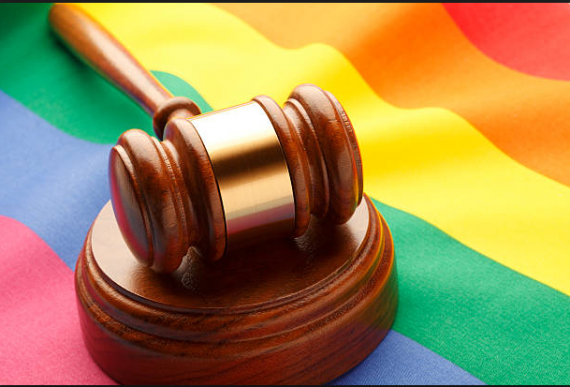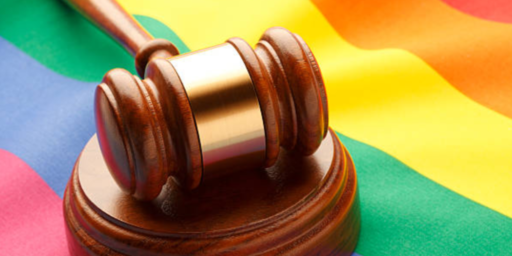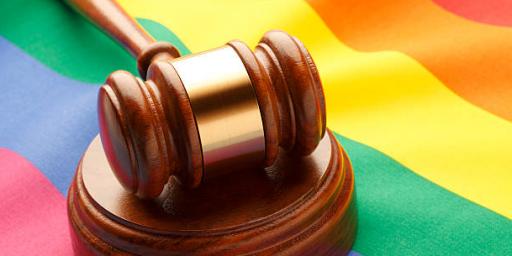Federal Judge Finds Civil Rights Act Bars Discrimination Against LGBT Employees
A Federal Judge in Texas has ruled that discrimination based on sexual orientation or gender identity is barred by Federal Law. Legally speaking, this is a tenuous argument at best.
A Federal Judge in Texas has ruled that Title VII of the Civil Rights Act of 1964 bars employment discrimination based on gender identity or sexual orientation:
For the first time in Texas, a federal judge said LGBT workers should be protected from employment discrimination based on their gender identity and sexual orientation.
Judge Lee Rosenthal, the chief judge in the Houston-based Southern District Court of Texas, said in a decision last week that federal employment law protecting workers from discrimination based on sex also applies to sexual orientation and gender identity.
Nicole Wittmer, an engineer who alleged she wasn’t hired by energy company Phillips 66 because she’s transgender, couldn’t prove her claim, Rosenthal ruled. But if she had proof, the judge added, Wittmer would have had cause to sue under federal law.
Rosenthal’s ruling doesn’t mean it’s suddenly illegal in Texas to discriminate against LGBT workers. But it may be cited in the future by others who believe their sexual orientation or gender identity was a factor in workplace decisions, Wittmer’s lawyer told The Dallas Morning News.
“We’re certainly disappointed that this particular ruling did not fall in her favor,” Alfonso Kennard Jr. said Monday. “The silver lining here is it has helped to define the landscape for people who have been discriminated [against] in the workplace due to their transgender status.”
“This ruling is earth-shattering — in a good way.”
Federal judges in several other states have already decided that lesbian, gay, bisexual and transgender workers are also covered under Title VII, the civil rights era-law that prohibits sex discrimination in the workplace.
But there has never been such a decision by a federal court in Texas, Louisiana or Mississippi, the states covered by the 5th U.S. Circuit Court of Appeals. Texas state law also doesn’t prohibit employment discrimination based on sexual orientation or gender identity, which means it’s still legal for Texas employers to fire or fail to hire someone because they’re LGBT.
Rosenthal, who was appointed in 1992 by President George H.W. Bush, said recent decisions in other jurisdictions helped shape her decision.
“Within the last year, several circuits have expanded Title VII protection to include discrimination based on transgender status and sexual orientation,” Rosenthal wrote. “Although the Fifth Circuit has not yet addressed the issue, these very recent circuit cases are persuasive. … The court assumes that Wittmer’s status as a transgender woman places her under the protections of Title VII.”
Harper Jean Tobin, policy director at the National Center for Transgender Equality, characterized the decision as part of a growing consensus that Title VII covers trans workers as well.
“This ruling, along with dozens of others, shows that discrimination against transgender workers is illegal under federal law,” Tobin said in a prepared statement. ”This is the overwhelming approach of the courts across the country over the last decade.”
Dale Carpenter, a constitutional law and LGBT rights expert at Southern Methodist University, said the ruling was the first of its kind in Texas.
It goes beyond a 2008 case in which another federal judge in Texas said gender nonconforming persons could not be discriminated against in the workplace, he said, because this one also recognizes transgender status as a protected trait.
“It is significant,” Carpenter said of Rosenthal’s decision. Agreeing with Tobin, he called it “part of a growing trend around the country.”
The case wasn’t exactly a victory for the Plaintiff notwithstanding the fact that the Court accepted her legal argument. While the Court did agree with the argument that discrimination based on sexual orientation or gender identity, it also ruled that the Plaintiff had failed to present sufficient evidence that the decision to rescind the job offer that was made to her was based on her status as a transgender woman. Accordingly, the Court granted the employer’s Motion for Summary Judgment and dismissed the Plaintiff’s case. While the Plaintiff can appeal this decision to the Fifth Circuit Court of Appeals, the fact that the decision was based on the factual record presented by the Plaintiff means that it will be difficult for her to succeed on appeal. Specifically, Rule 52 of the Federal Rules of Civil Procedure states that finding of fact cannot be set aside unless they are “clearly erroneous” based on the record on appeal and the appellate court is required to give “due regard to the opportunity of the trial court to make determinations on issues such as the credibility of witnesses. Given that, it is generally speaking much more difficult to convince a Court of Appeals to overturn a case where the decision is based on findings of fact than it is to be successful on appeal based on the trial court’s conclusion of law. All of this suggests that the Plaintiff may decide not to appeal the case at all, but she still has plenty of time to make that decision.
As the quoted article notes, the issue of whether or not Title VII’s protections extend to LGBT Americans has been the subject of several conflicting court rulings in recent years. Most recently, the Second Circuit Court of Appeals ruled that those protections did apply to discrimination based on sexual orientation, a ruling that overruled a prior ruling by a three-judge panel of the same court. Last year, a three-judge panel on the 11th Circuit Court of Appeals held that Title VII did not apply to discrimination based on sexual orientation.
To a large degree, the court in that particular case based its ruling on the fact that there was no evidence in the record that banning discrimination based on sexual orientation was within the contemplation of Congress when the Civil Rights Act was passed in 1964. One moth after that ruling, though, the Seventh Circuit Court of Appeals ruled in an en banc opinion that discrimination based on sexual orientation was “a form of sex discrimination” and therefore covered by the protections of Title VII. In December, the Supreme Court declined to hear an appeal in the 11th Circuit case. To date none of the other cases have made their way to the nation’s highest court and this particular case would take at least another year to get there assuming that the Plaintiff does decide to appeal the court’s ruling dismissing her case.
Notwithstanding the court’s ruling in this case, the argument that the protections of the Civil Rights Act of 1964 extend to discrimination based on gender identity or sexual orientation seem to be fairly tenuous. The legislative history of the law makes clear that the ban on discrimination based on “sex” was intended to cover situations where someone was not hired, fired, or treated unfairly on the job based on their gender, not based on whether they were gay, lesbian, or transgender. Put simply, this was not an issue at the time the law was drafted and it’s difficult to imagine that the legislators who voted in favor of the law intended for it to be interpreted to apply to discrimination based on gender identity or sexual orientation. On some level, I suppose one could argue that at the very least the law can be interpreted to bar discrimination based on “gender identity,” as some courts have done, but that doesn’t provide a basis for arguing that discrimination based on “sex” should also cover sexual orientation.
This has been most explicitly been recognized at the state level, where many states and localities have passed laws that bar discrimination based on sexual orientation by government agencies and by private businesses. At the Federal level, many people have been arguing in favor of a proposed law known as the Employment Non-Discrimination Act, which would expand Federal anti-discrimination law regarding employment to cover discrimination based on sexual orientation That law has been pending before Congress in one form or another for several years now but has not been brought up for a floor vote in either the House or the Senate. Instead of relying on the courts to deliver a very creative interpretation of a law that was passed fifty-four years ago, it seems to me that it would be more appropriate to leave the matter to the legislature where it belongs. It should not be the job of Judges to read things into statutes, or the Constitution for that matter, that clearly aren’t there.
None of this is to suggest that discrimination based on sexual orientation or gender identity isn’t wrong on some moral level, of course. Ideally, any discrimination based on anything other than one’s fitness for a particular job and job performance is unfair on some level. However, that is a different thing from the question of whether a law that was intended to bar one thing should be interpreted to bar something else. For better or worse, it is the job of the Legislative Branch to make law, the job of the Executive Branch to execute those laws, and the job of the Judiciary to interpret those laws in light of the Constitution. One can make the case that in our current political climate, the system isn’t exactly working that way and that it’s unlikely that something like ENDA is going to pass Congress unless Democrats gain control of both the House and the Senate, a filibuster-proof majority in the upper chamber, and a Democratic President, however, that’s immaterial to the situation. Judges should not be stepping in to do what some people think Congress should do just because Congress isn’t going to do it. That’s not how the law works, that’s not how the balance of powers set forth in the Constitution was meant to work, and that’s not how Judges should be doing their jobs.
Here’s the opinion:
Wittmer v. Phillips 66 by Doug Mataconis on Scribd





This is why the division of legal decisions into “conservative” and “liberal” as “we’re happy with things as they are” and “we think there’s a problem” doesn’t really hold. In a lot of cases it’s more a case where the “conservative judges” don’t want to stretch the law beyond what it was obviously originally written for and think that if there’s a problem, it’s up to the politicians to pass some new laws to solve said problem. The “liberals” try to stretch, because they know how much of a hassle it is to get legislation passed and it will probably be several years down the pipeline before it will get done. But both sides WILL agree that there’s a problem. They just disagree as to whose responsibility it is to fix things. (I forget which SCOTUS decision it was where Scalia basically said: “write a new law, you zit-heads in Congress! This isn’t in my bailiwick to solve!”)
If the argument this judge is making is “tenuous” what about Obergefell v. Hodges? I’m sure those who crafted the 14th Amendment certainly didn’t expect their work to be used in an argument for gay marriage…
Again Doug?
You keep saying this is “tenuous”. Courts keep disagreeing with you and you keep ignoring that the decision flows logically and rationally from PriceWaterhouseCoopers. At some point, you may want to engage with the actual argument instead of simply hand waving it away as not something that was on their minds at the time. You know that argument isn’t how the law actually works. Courts apply statutes and precedent, not mind reading.
Discriminating based on sexual orientation is all about those individuals not conforming to someone’s conception of how a “normal” person who was born male or female should behave/act/dress/identify. That is precisely the holding in PWC
@SKI:
Actually, the courts have been fairly evenly split on this issue and until SCOTUS rules on it, the matter remains very much up in the air. My suspicion is that the interpretation of Title VII we’ve seen from the Second Circuit and from this District Court would not fare well before the high court. In that regard, I would remind you that the 11th Circuit decision that found that Title VII does not apply in these situations was not allowed to stand by the Justices.
As for the remainder of your argument, I continue to believe that Courts should not be in the habit of broadly interpreting statutes and applying them to situations that were clearly not within the contemplation of Congress when the law was passed. If Congress wanted to say that Title VII applied to sexual orientation or gender identity, it could have done so and it is free to do so again in the future. Indeed, I would note that right now Congress would be equally free to pass a law that says that Title VII doesn’t apply to those categories. Or, it could pass something along the lines of the ENDA if it wishes to extend application of the statute to those categories of discrimination.
This is an issue of Separation of Powers, not a question of whether or not discrimination based on sexual orientation or gender identity in the private sphere (the public sphere, such as the military transgender ban is a different issue since that entails Constitutional provisions rather than merely statutory law) is right or wrong.
@An Interested Party:
Obergefell was a decision based on the equal protection clause of the 14th Amendment and involved government action. This is a decision based on Title VII and involves the action of a non-government entity. As I explained in numerous posts on the issue of same-sex marriage leading up to that decision, it was clear that even under the lowest standard of review under the Equal Protection Clause — the “rational basis” test — there was simply no logical rationale justifying the limitation of the right to marry that had been recognized in Loving v. Virginia to same-sex couples.
Analysis under statutes in general and Title VII specifically doesn’t work the same way. Specifically, in statutory interpretation, it has always been accepted that judges ought to be loathe to extend their construction of a law passed by Congress or a state legislature beyond what is spelled out in the statute itself.
@Doug Mataconis:
You’re making an argument clothed in “this is how I think it should be”. You’re a bright enough attorney to know that isn’t how this works.
SCOTUS precedent is clear on this matter re: Price Waterhouse v. Hopkins – gender stereotyping runs afoul of Title VII. I’m not sure that there is a more vivid example of gender stereotyping than predicating an access decision on what the employer believes an LBGTQ person should look and/or act.
If you want to make an argument regarding why you believe Hopkins was wrongly decided, have at it, but precedent is precedent. SCOTUS was clear – “gender” with respect to Title VII encompasses stereotypes predicated on gender. I would be interested in hearing how a hiring decision based on (or indeed even only partially involving) the perception that an applicant doesn’t look (transgender) or act (homosexual) as the reviewer believes he/should act with respect to their gender isn’t discriminatory within the context of Title VII as interpreted by SCOTUS.
@HarvardLaw92:
We’ve been over this before so I’m not sure if diving back in is going to accomplish much of anything. Suffice it to say that I fail to see how discrimination based on sexual orientation is based on gender stereotyping, although I can perhaps see an argument about how that might apply in the case of discrimination based on the entirely separate category of gender identity and transgender rights. (As an aside, I think putting the two issues in the same basket is mistaken since they are most assuredly not the same thing. And I thought we had all agreed that sexual orientation was based on identity, not actions. Your comment above seems to change that.)
I haven’t said that Hopkins was wrongly decided. I have said that I think it is tenuous at best to take that precedent, and Title VII itself, and apply it as far as the Second Circuit and this Court have. The 11th Circuit’s decision in that regard is particularly good at making the argument from the other side, I think.
In any case, we obviously disagree and I suppose that will continue unless and until we get a definitive ruling from the Supreme Court on the matter, or if Congress intervenes in the interim to amend the Federal law on that matter. It is admittedly unlikely that the second will happen.
@Doug Mataconis:
Not at all. The employer’s decision not to hire based on sexual orientation is predicated in his / her stereotype of what a specific gender should sexually be attracted to. Since the applicant disagrees with his/her imposed stereotype, he/she chooses not hire based on that disagreement and the negative connotations he/she associates with the failure to conform to the expected norm.
We have a definitive ruling on the matter. You can’t predicate a negative hiring decision on imposed stereotypes with respect to gender. ANY stereotypes implicating gender, be they stereotypes regarding what an applicant should look like or stereotypes regarding how an applicant should act. Consider the case of an applicant who is in fact heterosexual, but who conducts himself in a very effeminate manner. The employer’s perception will likely be that the applicant is homosexual, and the hiring decision becomes more likely to be impacted by bias predicated on gender stereotypes at that point. The bottom line is that gender stereotyping, across the board, is off the table when it comes to being a defensible rationale for a negative hiring decision. It’s really that simple.
@HarvardLaw92: this.
Perhaps enough tenuous decisions like this will weave themselves into a strong chain.
This is by no means clear. One could just as easily say that the decision not to hire, or to fire, someone based on sexual orientation, is based on some other way of looking at sexual orientation that has nothing to do with a “stereotype of what a specific gender should be sexually attracted to.” I’ll again refer you to the aforementioned 11th Circuit opinion and the cases cited therein.
In any case, we’ll just have to wait until SCOTUS speaks on the matter for a resolution of this question.